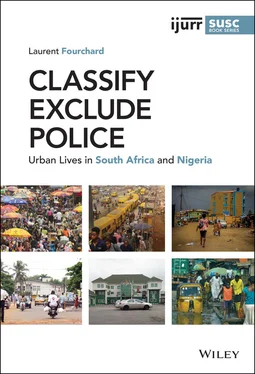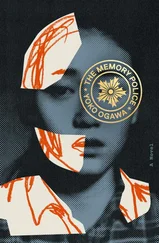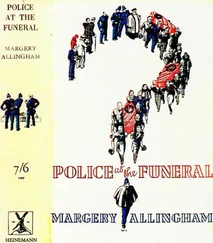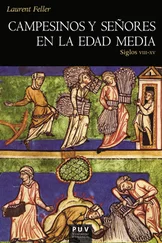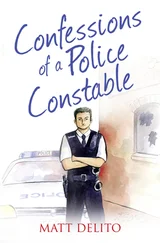The analysis of colonial cities as dual cities or areas in which coercion was tempered solely by forms of resistance misses the essence of what thirty years of historiography has taught us about Africa. Colonial societies cannot be understood merely as antagonism between Europeans and natives (Cooper 1994; Eckert 2006, p. 213), which reduces the colonial encounter to binary opposition (elites/subalterns, domination/resistance) (Bayly et al. 2006, pp. 1452–1456). The notion of the dual or racialised city overestimates the ability of administrations to implement steady public policy and ignore the dispersion of colonial power into a multitude of locales and authorities. It overlooks the capacity of local societies to circumvent, ignore or even conceive of such divisions differently and misses the pervasive social effects of other forms of colonialism in urban Africa.
First, the racial delusion of colonial power was articulated to other forms of classification based on residence, origin, gender and age, which together constitute a classifying obsession needed to govern urban areas. Colonial authorities were faced with contradictory injunctions. The first was the will to assign migrant populations to rural areas and the need for those same populations as manpower for the urban or the industrial economy. One of the solutions was to provide them with a specific place of residence and grant them different rights from the more permanent urban population even if this was difficult to implement as populations keep moving between urban and rural areas (what is referred to as the population flottante in French colonies). A second issue arose from the labour policies aimed at identifying and promoting an autonomous male working class, which became the standard against which a large part of the urban population became criminalised. ‘Unemployed’, ‘idle’, ‘unruly’ youth and ‘single’ women without wage jobs were increasingly seen as contributing nothing to the colonial economy, whereas their ordinary behaviour threatened the authority of chiefs, elders, husbands and wage workers. The invention of a nomenclature designed to rule by classification was central in governing the most dominated social groups in cities under the colonial rule.
Secondly, it is dubious to qualify the increasing forms of colonial surveillance over the urban population as a form of governmentality or in the words of Foucault as a process aimed to identify and reform individual conducts. 9 Historians of Africa are sceptical. Colonial domination was based less on the creation of individualised subjects than on the reified notion of traditional authorities (Cooper 2005). The colonial states in Africa did not necessarily need their subjects to be individualised and identified by the state and colonial institutions complained more about the lack of collective adjustment than individual adjustment (Cooper 2005). The process of counting the population for tax or demographic reasons, or weighing, classifying and measuring them in the case of workers did not attest itself to the emergence of a governmentality based on individualised knowledge of the population; it was a process of ‘unitisation’ rather than the creation of individual subjectivities (Vaughan 1991, p. 11). Far from being driven by a ubiquitous scientific curiosity about the well‐being of the population, African colonial states were built in an informational void: there is an inadequacy of an account of the state motivated by the search for knowledge in colonial and post‐colonial Africa (Breckenridge 2014, p. 5). Without immediately ruling out the analyses of governmentality, Frederick Cooper and Megan Vaughan sought to assess the relevance of this interpretive framework with regard to specific environments and time periods. The first part of the book tries to look at this specific surveillance and attempt to discipline new identified urban groups and determine whether specific dispositifs of government were able to identify and reform their individual conducts.
Thirdly, resistance to colonialism or apartheid is a very ambivalent process that could not be reduced to an opposition between an elite cooperating with colonisers against groups qualified as subalterns or in the words of Gramsci (1971) individuals subject to the activity of ruling groups. Moving away from a binary opposition between colonisers and colonised does not consist in underestimating the colonial violence but rather in thinking about the inextricable entanglement between the governing and the governed. 10 The new groups produced by the administration were not only abstract and fantasist bureaucratic categories but took roots in the urban social world. A detailed analysis of two notorious episodes of collective violence – the Kano riots in 1953 in Nigeria and the Sharpeville massacre in 1961 in South Africa – show not only resistance against colonialism or apartheid. Exploring the ways in which a set of various subaltern groups played different roles in these two episodes reveals how they could absorb many ideas from the ruling class while at the same time judging their everyday experience contradicted that domination. Administrative categories produced during the colonial period have actually been appropriated by a set of social and political actors and lasted after the end of colonial rule or the apartheid regime.
Part II retraces the genealogy of policing carried out by organisations in low‐income neighbourhoods from the colonial period to the present. In the policing literature, there is a distinction between law enforcement carried out by the ‘police’ – the name commonly used to designate a state organisation with a specific mandate – and ‘policing’ which designates a plurality of organisations including the police (Garland 2001; Jobard and Maillard 2015). This second part focuses on groups and individuals policing neighbourhoods often included under the term ‘vigilante’. It wishes to open up a nascent dialogue between comparative urban studies and the history and anthropology of policing to rethink the act of policing in low‐income neighbourhoods.
The anthropology of vigilantism on Africa has, on the one hand, largely focused on the relationship between vigilante groups and the various arms of the state, their role in building communities, their use of violence and the multiple threats identified by vigilante groups (Buur and Jensen 2004; Kirsch and Gratz 2010; Pratten and Sen 2007; Smith 2019). Contemporary policing by non‐state actors are to be found everywhere in Nigeria and South Africa but how this has emerged from specific struggles, alliances and conflicts remains unclear. There is actually a paucity of research on how the day‐to‐day work of these groups have reshaped ordinary urban experience over a long period of time, their role in exercising public authority in neighbourhoods, in excluding or including residents, and the ways in which they have participated in the regulation or banalisation of daily violence. A genealogical approach exploring what has been forgotten and what has been naturalised over time helps to reconsider the very act of policing in these cities. Joining historical and ethnographic methods enables answering key questions left aside in the literature on vigilantism. Is the violence manifested by these organisations the same when it is authorised (during the colonial period and apartheid) and when it is prohibited (today)? Are vigilante organisations regulated in the same way when bureaucratic resources are meagre (the colonial period) and when police forces have been significantly expanded (today)? How do they exercise power over the people residing there and who has the authority to govern the neighbourhood? Exploring past and present everyday policing helps to disentangle continuities and discontinuities from within the neighbourhood.
Читать дальше
